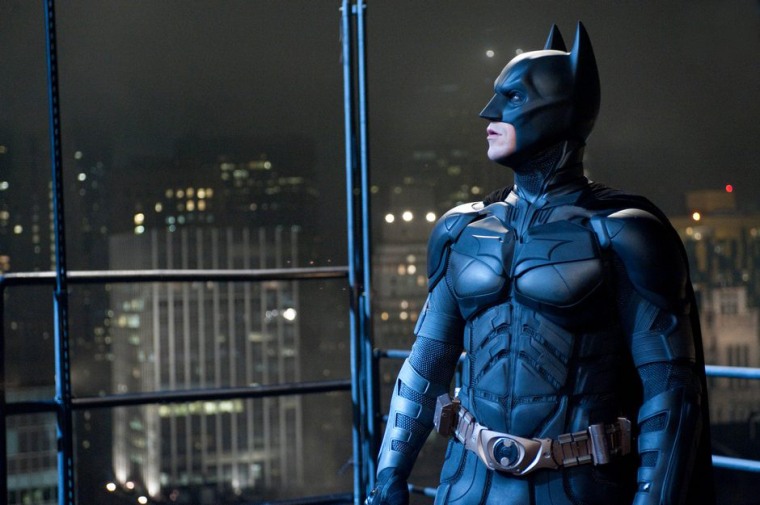As with most octogenarian billionaires, the person being celebrated for his contributions this coming week hardly deserves or needs wider recognition. His efforts to give back to his community seem to result in far more tragedy than real triumph. And, it need hardly be said, his coterie of close acquaintances are just plain sleazy.
I speak, of course, of Batman.
The caped crusader turned 80 in May, with the shipment of Detective Comics #1000 and the 30th anniversary of the Tim Burton movie about his life and adventures the following month. Attendant festivities will follow at this week’s San Diego Comic Con.
Batman was the product of an era when you couldn’t throw a rock at a newsstand without hitting a pulp magazine or a comic book about a wealthy, idle playboy, driven by his conscience to don something vaguely Draculoid and smack or shoot a villain: Batman, The Shadow, The Spider, The Green Hornet, The Phantom, Zorro and so on all had money to burn and an unslakable thirst for violent justice.
Morally speaking, I’ll grant that they all have their problems, but I’ll say this to their eternal credit: At least they didn’t try to run for president. (Batman was a senator, once, for a couple of days, but that’s it.)
Our real billionaires are less likely to spare us.

Lots of people have believed themselves equal to leading the country by virtue of their bank balances. Before President Donald Trump, they hadn’t been able to win — the recently deceased Ross Perot was the most impressive failure in a series of ignominious ones, like Meg Whitman and Nelson Rockefeller. Tom Steyer is the latest billionaire to toss his hat in the ring after Howard Schultz scurried off on a “hiatus” in June. Presumably, both men gave it a try on the theory that, if a racist game-show host like Trump can win the presidency by doing little more than calling Latino people ugly names, after which he need only spend three years riding his predecessor’s economic coattails, anybody with enough money to waste campaigning ought to be able to pull the thing off.
What’s amazing is that the super-rich have kept trying, as though each one of them is convinced he or she is secretly the one and only Batman, smarter than all the others and secretly, perfectly suited to unlimited power. Of course there’s no way anybody with a billion dollars has anything like the skill set necessary to run an enormous bureaucracy with dozens of vital appointments on which the very lives of millions of men and women depend; billionaires spend their time making money by exploiting the labor of thousands they'll never see, not managing H.R. to better the lives of 300 million (or, on the international stage, upwards of 8 billion) they'll never meet.
But try to use their money-making acumen in service of ruling over the actual lives of others they do, and with the occasional, limited success — mini-Trumps, if you will. There’s Michael R. Bloomberg, the former New York City mayor and occasional presidential candidate who presided over massive rent increases (and the concomitant massive increase in the homeless population), defended the indefensible stop-and-frisk policy of the police department that blatantly, unconstitutionally targeted black and brown New Yorkers, and violently broke up the Occupy Wall Street protests. Or take former Tennessee governor and Pilot Petroleum scion Bill Haslam, who rescinded policies that forbade contractors from discriminating against LGBT people, instituted a voter ID requirement widely seen as a way to suppress minority voter turnout, criminalized women who used drugs during pregnancy if their pregnancies ended before term and also violently broke up Occupy Wall Street protests, repeatedly and against court orders, among other acts.
There's also turncoat West Virginia coal mining heir Jim Justice, who cut taxes on mostly out-of-state energy companies as his state’s roads fell into disrepair, and simply refused to pay more than half a million dollars in taxes of his own in rural Kentucky; and Nebraska governor Pete Ricketts, inheritor of his Republican fundraiser dad’s brokerage bucks, who sued the federal government for not deporting small children, told then-president Barack Obama not to send any Syrian asylum-seekers to Nebraska when none appeared to be incoming, and whose field director recently made headlines for being a white nationalist, among others.
Billionaires, it seems, trend toward the Lex Luthor end of the superhero comics spectrum.
Batman, of course, is fiction, but it’s worth remembering from the history of massively wealthy politicians that one of the most fictional things about him is his obsession with righting wrongs and undoing unfairness. Here on Earth-prime, a billion dollars in one place is unfairness by definition, especially when it comes from the seed of inherited wealth, as is the case with so many of the above politicians as well as with the caped crusader. Bruce Wayne’s net worth has grown with the times but, in its current iteration, he has a fortune so large that its simple existence is portrayed as untrammeled political power.
And untrammeled political power is what having billions of dollars is: If you somehow come into a billion dollars, you keep it because it gives you influence over governments and corporations, not because it makes the daily business of living more pleasant than a tenth of that wealth would. Nobody needs a billion dollars to make sure all their grandkids can pay to go to Yale or to buy a fancy house or even a private jet; those are costs in the millions, or the tens of millions. Like J.K. Rowling and Jon Huntsman Sr., as a billionaire, you can simply give away so much of that money to charity that you stop being a billionaire and not actually miss it.
So if you keep it, it's because you seek power, not simple luxury. And if the recent past has taught us anything, it’s to fear and distrust people who seek power, no matter how noble or wise-sounding their stated goals. Whatever slogan you slap on it, the aim of power is always the consolidation of more power.
Perhaps that's why our real billionaires always tell a tiresome story about a wealthy man who wants to change the world in his image, and perhaps not quite for what anyone else would call the better; Batman, at least, has a utility belt full of tricks and a universe of improbable friends and enemies. Starbucks' Schultz, Steyer, Trump, Justice, Ricketts and doubtless more to come continue to pursue the same unimaginative strategy: Arrogating power directly to themselves. It is, after all, the only thing they’ve proven they can do well. Good governance requires self-sacrifice; the fact of their billions demonstrates that they’re incapable of that.


